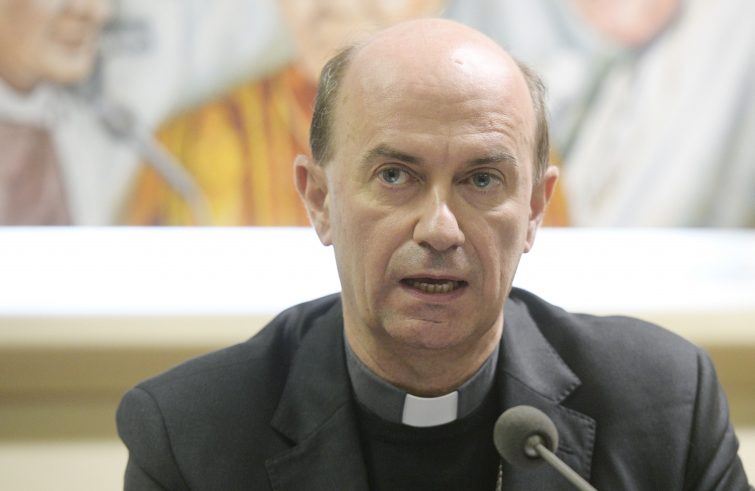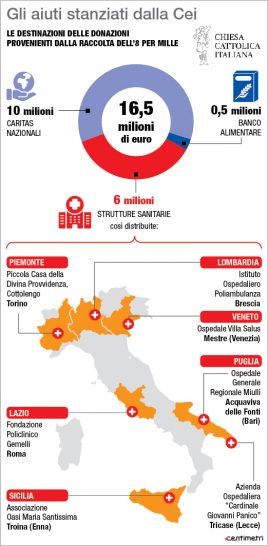
“I would like to extend a grateful thought to all our media which, in different forms and according to each one’s unique characteristics, are weaving the thread of our communities. My heart is pierced by the words written to me by several diocesan weeklies over the last few days: our pages have become a never-ending obituary. I feel the suffering of our local realities and I assure everyone of the closeness of the Italian Church. Thank you!”, said Msgr Stefano Russo, Secretary General of the Italian Bishops’ Conference in the days leading up to Holy Week, which this year will be lived by an entire country under quarantine: “I must point out that the closeness of the Church in Italy is also expressed through concrete gestures. In particular, we have promoted two fundraising subscriptions: Support to Health and Coronavirus Emergency, together with Caritas Italy.”
Your Excellency, from the very start the Italian Church has made many efforts to address the pandemic also in terms of charitable and solidarity services, contributing more than 16 million euros. Dozens of dioceses throughout Italy are offering their facilities to the Civil Protection, to doctors and people under quarantine…
The geography of charity is constantly evolving. The various charitable and solidarity-based initiatives are all motivated by the conviction that Christ is present in the suffering faces of our brothers and sisters. This certainty stems from the Gospel of Matthew: “I was hungry and you gave me food…”. These words are the imperative benchmark of our actions. In the present situation, in which all our certainties are exposed, we rediscover the meaning and value of closeness, of care, of relationships… In a word: of charity, which is always unspoken, but active.
Without clamour for recognition the Church assures co-responsible support to doctors, healthcare workers and the sick.
It is an act of renewed care and generosity shown by many citizens every year who devolve 8% per thousand of their income tax to the Catholic Church.

Public health is experiencing serious difficulties and the Catholic health system is also doing its part. The Italian Bishops’ Conference supports healthcare structures in various ways.
In response to some of the many health emergencies, the Italian Bishops’ Conference – following the suggestion of the Bishops’ Commission for Charity and Health – has so far allocated 6 million euros, in two €3 million instalments, drawn from taxpayers’ “Eight per thousand” contributions to the Catholic Church. The first financial aid package, on March 24, went to the Piccola Casa della Divina Provvidenza del Cottolengo in Turin, the “Cardinal Giovanni Panico” Hospital in Tricase, the Oasi Maria Santissima Association in Troina, near Enna, and the Istituto Ospedaliero Poliambulanza in Brescia. The second one, of 30 March, will support the Gemelli Polyclinic Foundation, the Villa Salus Hospital in Mestre and the Miulli Regional General Hospital in Acquaviva delle Fonti in the province of Bari. Moreover, a fund-raising initiative has been launched, duly documented and which will assist other realities.
With the suspension of school activities, private schools are also experiencing a crisis. What do you expect from the political sphere?
On several occasions the General Secretariat of the Italian Bishops’ Conference informed the Ministry of Education of the dramatic situation faced by private, officially recognised schools.
On behalf of many families, teachers living without pay, and schools which, in these circumstances, are unlikely to reopen in September – to the detriment of the common good – a number of basic requests have been made in writing and verbally to address this situation.
We expect that step will taken.
Many priests have lost their lives, many of them died while fulfilling the duties of their ministry. What are your words for all of them?
All our priests are constantly close to the people, faithful to their vocation until the end, living with their sheep, as Pope Francis often repeats. To such an extent that, in this circumstance, they also shared their illness and, unfortunately, in many cases, death.
We remember them first of all to cherish the memory of their life, of their actions, of what they left in the hearts of those who knew them.
Catholic and non-Catholic media have praised these brothers and sisters commemorating lives expended for their fellow others. Many were missionaries who returned to Italy after a lifetime spent with the world’s poorest; others were diocesan priests, some of them retired – but does a priest ever really retire? – after having seen generations of faithful grow up, often in small parishes, where people recognize each other as family and where many have mourned them, together with their bereaved ones. This is also a reminder of the precious mandate of belonging to a community; a mandate whereby we are called to interpret the newness we face and to engage in new ways of being Church.
We have a Holy Week ahead of us without the people’s participation. What kind of Easter will it be?
It will certainly be a different Easter: we are experiencing a new reality that is unprecedented for everyone. The Holy Week flows into the heart of our faith. For this reason, despite the hardships of the present moment, we must not forget that we are on our journey towards Resurrection. This horizon helps us live Easter time to the fullest.
We stay at home, but we’re not alone!
I encourage everyone to rediscover the deep meaning of what, unfortunately, we will not be able to live together this year, in order to celebrate together in the near future. That feast, which will be Easter for all of us, will also be a moment of comfort for those who have left us and for their families. I repeat: we are not alone!
From North to South, Masses are increasingly celebrated in live streaming, spiritual long-distance accompaniment is growing, and people are meeting on social networks to gather together in community. Many priests are exploring new forms of celebration and accompaniment of the faithful. How do you rate this unexpected ecclesial season?
I see a growing sense of belonging. The various initiatives respond to a deep desire to act as a community. Somehow the questions of our people need to be answered. This led our General Secretariat to develop the digital platform chiciseparera.chiesacattolica.it, to give renewed impetus to the good practices implemented by dioceses, offering precious food for thought – letters, messages and multimedia content by the bishops -, along with news and pastoral material. Ours is a season of great creativity, enabling us to extend our gaze beyond the emergency. And in that gaze we cannot but be sustained by hope, nourished by faith and charity. When all of this is over we will have the opportunity to reflect on what we have lived through, remembering that it is an exceptional situation. And that we cannot do without that fraternal encounter that has always characterized us.










